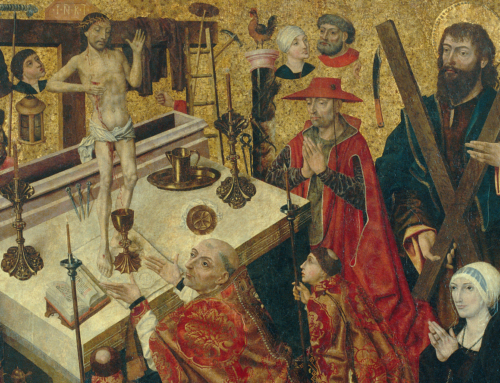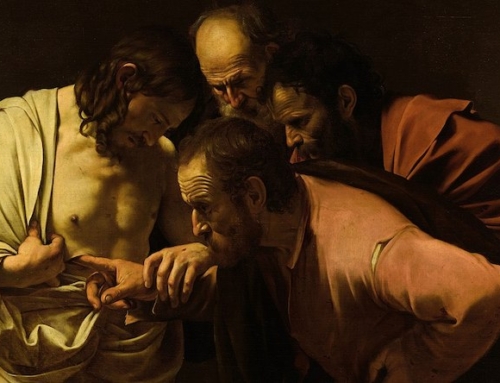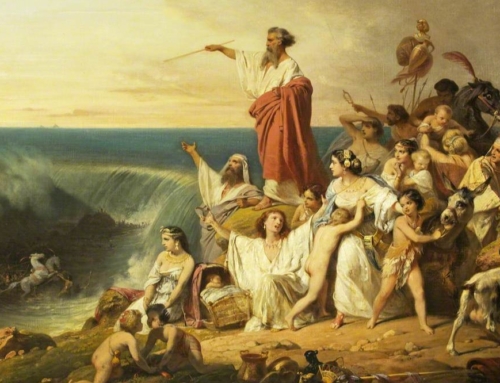Editor’s Note: Today we are delighted to release the online edition of Dominicana 66 (2023), which is distinct from the content published regularly on the blog. This year’s edition of Dominicana considers the place of the Eucharist in the life of the Church.
Please find below the introductory editorial, along with a PDF preview of the table of contents and one free article. To order a digital or print subscription, please click here. As always, we are deeply grateful for your support, all of which goes toward our religious and priestly formation.
May God bless you as we prepare for the Lenten season!
* * *
Our journey to beatitude is a story of God’s love for us. It is the story of eternal life, one in which God offers to humanity the Word, his Son, who is nailed to a tree for our salvation. He did not have to die for our sake, and yet he did as the definitive way for us to return to him in the heavenly kingdom (Summa theologiae III, q. 46, aa. 1 and 3). Not only does God put the destination of our journey on the map, but he also traces for us the way to get there and provides the means of transportation. He whispers, “Come to me through my Son” (see Jn 14:6), and then he shows us the way. It is the way of grace through the sacrament which truly is the body and blood of our Savior. It is the Eucharist. The American Church’s Eucharistic Revival presents an opportune moment for Dominicana to explore the depths and wonders of the Eucharist, which is the center of our sacramental life and “the greatest of all sacraments” (ST III, q. 65, a. 3). It is the sacrament of God’s love for humanity that takes us to the journey’s end, the City of God.
Brother Nicodemus opens this year’s journal by exploring the Eucharistic theology of St. Thomas Aquinas and investigates exactly how this sacrament builds up the Church and sanctifies her members. Brother Cyril continues by looking to the Old Testament as the lens through which Christ’s offering of his own blood can be better understood.
Art in its various forms allows man to express the inexpressible. Brother Benedict surveys the many intricate elements of Federico Barocci’s Counter-Reformation masterpiece, The Institution of the Eucharist, showing how this painting contributed to the catechesis of the faithful in the wake of the Protestant rejection of the Real Presence and other aspects of Eucharistic doctrine. Brother Finbar takes a detailed look at St. Thomas’s beautiful hymn, the Lauda sion salvatorem, pointing out how the Angelic Doctor brings Eucharistic theology alive in ways only possible to someone truly skilled in the art of poetry.
The grace of the Eucharist has spurred numerous popular devotions throughout history, especially the Eucharistic procession. Brother Jeremiah reflects on these processions and the unique way that they help us to follow God in this life. Brother Bertrand investigates what it means to have friendships rooted in the Eucharist, while Br. Samuel contemplates how the Eucharist enables Christ to be universally present to us.
We are pleased to share two powerful interviews with our readers. Brother Linus presents a conversation about the Eucharist as a source of hope and love with Archbishop Timothy Broglio, president of the United States Conference of Catholic Bishops and Archbishop for the Military Services, USA. Brother Titus discusses the hiddenness of Eucharistic life found at the Monastery of Our Lady of Grace (North Guilford, Connecticut) with chaplain and friar of the Province of St. Joseph, Fr. Brian Mulcahy, O.P., and prioress, Sr. Maria of the Angels, O.P.
An unpublished conference manuscript preached by Dominican spiritual master, Fr. Raymond Boulanger, O.P., to the Carmel of Paris provides a magnificent reflection on how the Blood of Christ is the key that opens the gate to beatitude. Translated by Brother Charles from the original French, this conference was cherished by St. Thérèse of Lisieux as theological support of her “Little Way.”
Five book reviews cover a number of topics related to the Eucharist, both directly and indirectly. Brother Patrick reviews the classic text written by Fr. Marie-Vincent Bernadot, O.P., From the Eucharist to the Trinity, while Br. Cassian discusses the biblical basis for holy orders as explored in The Bible and the Priesthood, written by the Province of St. Joseph’s own Fr. Anthony Giambrone, O.P. Brother Augustine presents Sally Thomas’s new novel, Works of Mercy, and Br. Roland introduces us to the life of Bl. Carlo Acutis as told by his mother in My Son Carlo. Brother Anselm rounds out our reviews by considering the late Pope Benedict XVI’s reflections on the Eucharist in God Is Near Us.
Finally, we hope you enjoy the beautiful artwork throughout Dominicana 66, painted by Spanish artist Raúl Berzosa. His sacred art presents marvelous modern reflections on classical themes, and we thank him for granting us permission to use the fruit of his labor! More information about Mr. Berzosa’s paintings can be found on his website, https://raulberzosa.com/.
The Eucharist has glorious effects in our lives. They are not always evident in the moment, but by faith we know that God desires our perfection and gives us the means—the sacraments— to help us along our journey to heaven. He remains with us, always present in the Most Blessed Sacrament. Placing all of our hope in God, may we trust the words of Christ in the Letter to the Hebrews: “I will never leave you nor forsake you” (Heb 13:5).
Click to view the Table of Contents and the Argument and Br. Bertrand’s “Convivium: Eucharistic Friendship with God and Neighbor.”
✠
Image: Detail from Triunfo de la Eucaristía by Raúl Berzosa (used with permission).







